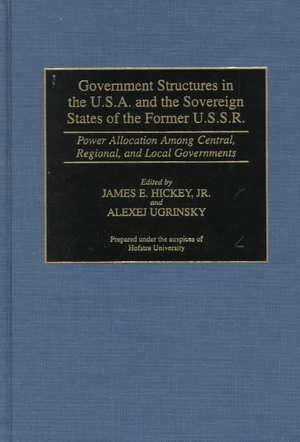Government Structures in the U.S.A. and the Sovereign States of the Former U.S.S.R.: Power Allocation Among Central, Regional, and Local Governments: Contributions in Political Science
Autor James Hickeyen Limba Engleză Hardback – 29 aug 1996 – vârsta până la 17 ani
Din seria Contributions in Political Science
- 38%
 Preț: 438.51 lei
Preț: 438.51 lei - 27%
 Preț: 441.64 lei
Preț: 441.64 lei - 28%
 Preț: 436.80 lei
Preț: 436.80 lei - 38%
 Preț: 437.47 lei
Preț: 437.47 lei - 38%
 Preț: 345.58 lei
Preț: 345.58 lei - 24%
 Preț: 460.68 lei
Preț: 460.68 lei - 38%
 Preț: 437.84 lei
Preț: 437.84 lei - 22%
 Preț: 231.81 lei
Preț: 231.81 lei - 38%
 Preț: 436.57 lei
Preț: 436.57 lei - 27%
 Preț: 346.07 lei
Preț: 346.07 lei - 27%
 Preț: 345.74 lei
Preț: 345.74 lei - 28%
 Preț: 436.99 lei
Preț: 436.99 lei - 38%
 Preț: 345.30 lei
Preț: 345.30 lei - 28%
 Preț: 437.91 lei
Preț: 437.91 lei - 23%
 Preț: 171.93 lei
Preț: 171.93 lei - 28%
 Preț: 344.63 lei
Preț: 344.63 lei - 27%
 Preț: 437.84 lei
Preț: 437.84 lei - 38%
 Preț: 438.41 lei
Preț: 438.41 lei - 23%
 Preț: 223.20 lei
Preț: 223.20 lei - 28%
 Preț: 437.57 lei
Preț: 437.57 lei - 38%
 Preț: 346.00 lei
Preț: 346.00 lei - 27%
 Preț: 346.50 lei
Preț: 346.50 lei - 28%
 Preț: 438.07 lei
Preț: 438.07 lei - 27%
 Preț: 439.09 lei
Preț: 439.09 lei - 38%
 Preț: 436.99 lei
Preț: 436.99 lei - 28%
 Preț: 435.65 lei
Preț: 435.65 lei - 38%
 Preț: 438.17 lei
Preț: 438.17 lei - 38%
 Preț: 346.25 lei
Preț: 346.25 lei - 23%
 Preț: 229.50 lei
Preț: 229.50 lei - 27%
 Preț: 440.79 lei
Preț: 440.79 lei - 38%
 Preț: 345.83 lei
Preț: 345.83 lei - 38%
 Preț: 438.00 lei
Preț: 438.00 lei - 28%
 Preț: 437.84 lei
Preț: 437.84 lei - 38%
 Preț: 436.99 lei
Preț: 436.99 lei - 27%
 Preț: 438.67 lei
Preț: 438.67 lei - 28%
 Preț: 438.07 lei
Preț: 438.07 lei - 11%
 Preț: 356.63 lei
Preț: 356.63 lei - 28%
 Preț: 438.00 lei
Preț: 438.00 lei - 32%
 Preț: 231.69 lei
Preț: 231.69 lei - 38%
 Preț: 438.41 lei
Preț: 438.41 lei - 28%
 Preț: 461.11 lei
Preț: 461.11 lei - 32%
 Preț: 231.89 lei
Preț: 231.89 lei - 19%
 Preț: 182.01 lei
Preț: 182.01 lei - 38%
 Preț: 436.47 lei
Preț: 436.47 lei - 38%
 Preț: 439.17 lei
Preț: 439.17 lei - 38%
 Preț: 437.07 lei
Preț: 437.07 lei
Preț: 444.08 lei
Preț vechi: 607.77 lei
-27% Nou
Puncte Express: 666
Preț estimativ în valută:
84.99€ • 88.40$ • 70.16£
84.99€ • 88.40$ • 70.16£
Carte tipărită la comandă
Livrare economică 15-29 aprilie
Preluare comenzi: 021 569.72.76
Specificații
ISBN-13: 9780313296536
ISBN-10: 0313296537
Pagini: 488
Dimensiuni: 156 x 235 x 27 mm
Greutate: 0.86 kg
Ediția:New.
Editura: Bloomsbury Publishing
Colecția Praeger
Seria Contributions in Political Science
Locul publicării:New York, United States
ISBN-10: 0313296537
Pagini: 488
Dimensiuni: 156 x 235 x 27 mm
Greutate: 0.86 kg
Ediția:New.
Editura: Bloomsbury Publishing
Colecția Praeger
Seria Contributions in Political Science
Locul publicării:New York, United States
Notă biografică
JAMES E. HICKEY, JR., is Professor of Law, School of Law, Hofstra University.ALEXEJ UGRINSKY is Director, Documentation, Finance and Planning, Hofstra Cultural Center.
Cuprins
Historical PerspectivesPolitical Structure and Power: Is Philadelphia a Model for Moscow? by John N. HazardThe First National Constitution of the United States by Gordon S. WoodThe Russian Federation: History and Contemporaneity by Mikhail MarchenkoThe Limits of Federalism and the Collapse of the U.S.S.R. by Robert V. DanielsIncipient Federalism in Late Imperial Russia by Thomas Earl PorterA Comparative OverviewModern Federalism: Comparative Perspectives and Lessons for the Commonwealth of Independent States and Russia by Erik P. Hoffman and Richard P. NathanAmerican and Soviet Perspectives on Federalism: A Cross-National Analysis by Sarah F. Liebschutz and Barbara Jancar-WebsterReconstruction in the U.S.S.R. and the Experience of the West by Vladimir A. SavelievA Comparative Analysis of Theories of Sovereignty in the Former U.S.S.R. and Yugoslavia by Helen OstrovidovaGovernment Power and AccountabilityJudicial Power in the United States by Hans A. LindeThe Role of the Courts in the Federal System of the United States by Martha A. FieldConstitutional Interpretivism and Criminal Procedure in the New Russian Constitution by Catherine Thérèse ClarkeThe "President" and State Authorities in Ukraine by Yurii S. ShemshuchenkoState and Federal Foreign Affairs Power in the United States by Susan W. TiefenbrunDelineation of Foreign Policy Powers Within the Framework of the Soviet Confederation (Based on Materials of Kazakhstan and Central Asian States) by Marat A. SarsembayevInternational Trade and Investment Relations Under the Federation Treaty by W. Gary VauseState and Local GovernmentFederalism in Political Structure and Power: The New Role of Federal Law in Constraining Political Processes in American State and Local Governments by Richard BriffaultDecentralization Costs and Benefits: Designing a Federal State by Philip J. Grossman and Priya RajagopalanMunicipal Strategy for Developing Regional Free Enterprise in Siberia by L. M. SimonovaThe Struggle for Power Allocation Between the Central Government in Moscow and the Administration of the Tyumen Region by Alexei I. IvandaevElements of Federalism in Relations Between Regional and Local Authority During the Perestroika Period in the U.S.S.R. (As Exemplified by Siberia) by Irina A. VekshinaThe Role of National Institutions of Local Government in the Socioeconomic Development of Indigenous Northern Populations in Siberia by Gennadii N. ChebotarevCommunication and NewsFederal Preemption of Local Regulation of Cable Television by Thomas W. HazlettLevels of the Game: Federalism and the American News System by Stephen HessEnergy and the EnvironmentReform of Federalism and Ecological Security by Oleg S. KolbasovFractal Federalism: Evolving National-State Relations in U.S. Environmental Law by Lee P. BreckenridgeFederalism and Problems of Environmental Protection in Sovereign Ukraine by Svetlana N. KravchenkoThe Issue of Ecological Federalism in the Context of Regional and World Development by Yuri TunitsiaThe Government Structure Over the U.S. Electric Industry: Federal-State Tensions by James E. Hickey, Jr.The Influence of Local Authorities and the Public on Energy Policy in Ukraine by Victoria YegorovaEconomics, Finance, and BankingThe Invisible Thread: Free Market Forces in Pre- and Post-Soviet Russia by Robert B. CharlesMarket Economy and Federalism by Jonah OtelsbergEconomic Sovereignty: New Aspects of Interaction Between Economics and Politics by Temiruz A. BeridzeFederal Aspects of the Development of U.S.S.R. and RSFSR Economic Laws During the Period of Perestroika by Olga FloroffFinancial Reform in the Former U.S.S.R. by Nicholas N. KozlovSome Aspects of the Banking System in Russia by Sergei N. Gonchar and Tatiana U. FrolovaDesigning a Bank Regulation System for the Former U.S.S.R.: Federalism Issues Under the U.S. Dual Banking System by James W. WellerIndividual and Collective Human RightsMoral Dimensions of Federalism by William RichProtection and Promotion of Human Rights: Power Allocation Among Central, Regional, and Local Governments in the Russian Federation by Boris A. TsepovConcept of Federalism in Light of the Rights of Nations to Self-Determination by Boris Sergeevich KrylovCultural Problems of Federalism in Tajikistan by Zulfia MirshakarConsumer Protection Laws of the States: How Much Diversity Should the Central Government Discourage? Where Desirable, How Should Unifo













